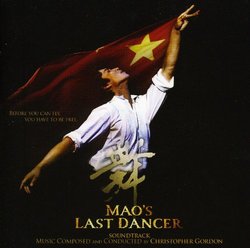Magnificent
Jon Broxton | Thousand Oaks, CA | 01/01/2010
(5 out of 5 stars)
"An acclaimed Australian film directed by Bruce Beresford, Mao's Last Dancer tells the true life story of Li Cunxin who, having been born in poverty in rural China in the 1960s, was selected to attend the famed Beijing Dance Academy to study ballet. During a trip to the United States in the 1970s, Cunxin began to question his Communist upbringing, and ultimately defected to the United States, where he went on to become one of the most acclaimed male ballet dancers in the world, dancing with the Houston Ballet for 16 years. The film stars Bruce Greenwood, Kyle McLachlan, Amanda Schull, Joan Chen, and Chi Cao as Cunxin, and features a superb original score by Aussie composer Christopher Gordon.
Gordon is a composer whose work, although roundly critically acclaimed, has never truly resonated with me on an emotional level. Scores like Master and Commander, On the Beach and Moby Dick, while undoubtedly excellent, always seemed to be a little too restrained, a little too aloof, to be truly memorable. Thankfully, Mao's Last Dancer changes all that. It's thoroughly wonderful from start to finish, and has finally convinced me of Christopher Gordon's standing as a composer of great talent.
Anyone who knows me well knows that Chinese-style music played by a Western orchestra is one of my favorite things, and Mao's Last Dancer features that kind of music in spades. The idyllic opening, "Out of the Well", has a lush, beautiful refrain featuring dizi flutes and pipa lutes that depicts the natural beauty and cultural heritage of rural Qingdao province, where Li was born. Cues such as the lively "Village Life", the intimate "Lullaby", the sprightly "Story of the Frog", the warm and peaceful "Family", and the superb "The Archer" maintain the oriental stylistics through a series of authentic sounding rhythms and orchestrations that root the first part of the score firmly in the Orient, while retaining a rich western symphonic sensibility. Admirers of scores in the vein of Rachel Portman's The Joy Luck Club, or Conrad Pope's Pavilion of Women, will find much to enjoy in the early part of the album, although some of the most authentic moments may be a little off-putting with those who do not have an affinity for the style.
When the film moves from the Chinese countryside to the Beijing ballet stage, Gordon's music moves with it, embracing fully the bold classicism of the genre. "Pas de Deux" is a transcendent piano theme; "Turning Points" has a dramatically regal and uplifting quality; "Madam's Model Ballet" and "Becoming a Dancer" are both playful and pompous, merging traditional Chinese instruments with the orchestra in a pair of cues of great beauty and power, as Li perfects his craft. The jazzy and bold "Free Dance" owes a great debt to Leonard Bernstein's West Side Story with its staccato piano rhythms and defiantly modernistic style. The utterly mesmerizing "Dance of Longing" is so stunning is breaks your heart, as it revels in dark, velvety string harmonies, and a violin solo of wonderful clarity and precision. The way Gordon is able to move seamlessly between traditional Chinese instruments, symphonic orchestral writing, and even modernistic jazz is enormously impressive, and effectively highlights his obvious talent.
When the film moves again, from China to the United States, Gordon plays upon the drama of Cunxin's life-changing decisions, and the ultimate triumph of his new life away from the stifling Chinese regime. He fills "The Consulate" with a powerful sense of string and piano-based raw emotion laced with more than a hint of tragedy, as the diplomatic incident surrounding his defection escalates. Memories of home are rekindled through a reprise of the Pas de Deux theme and more authentic Chinese instrumentation in "Brush Dance/Zhang Ban Qiao", before the score comes to an emotionally heightened close in the intimate and tender "Break Up and Finale" and the sweeping "Village Dance and Finale", both of which are simply stunning. I don't remember Gordon writing music of such amazing beauty before, but if this is the kind of writing he is capable of then, then he needs to be hired more frequently than he is now.
If that were not enough, there are several source music pieces - notably the amusing "Sirhc Nodrog's Book of Ballet Exercises for the Pianoforte in D, B Minor, C Minor, Bb, F, C, G, E Minor, F# Minor and A" - as well as excerpts from famous ballets such as Swan Lake and Giselle, which feature outstanding solos by virtuoso pianists Simon Tedeschi, Clemens Leske and Josephine Allan, violinists Michael Dauth and Natsuko Yashimoto, and harpist Louise Johnson, further enhancing the rich, classical feel of the album.
Mao's Last Dancer is film music at its best. The album is structured such that it actually it tells a story, fluidly charting the ups and downs and musical accompaniments of Li's life. It is steeped in bold, colorful orchestral textures and stirring themes, and manages to be exotic enough to be interesting while remaining emotionally centered enough to be effective at conveying those emotions to its audience. It's one of the best scores of 2009, and comes highly, highly recommended."

